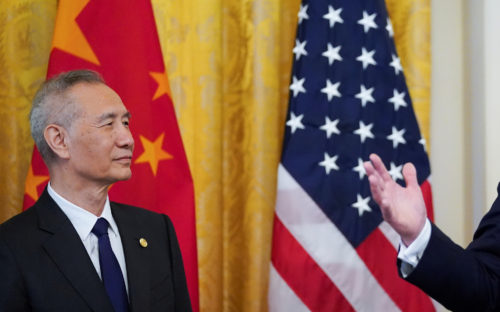What Warren’s trade plan means for China

There seems to be no end in sight to the U.S.-China trade war, even as both economies slow down and the need for stability in trade grows. President Trump, though, remains defiant — even calling himself “Chosen One” to “economically take on China.” He’s clearly reveling in his status as the toughest president on China in living memory, and that may pay off politically, trade deal or not. But having only focused narrowly on issues like IP theft and trade deficits, he’s left himself wide open for the Democrats to outdo him. So far, that’s been Elizabeth Warren and the plan she released last month to completely overhaul U.S. trade policy.
The document, in Warren’s words, is “my plan for using economic patriotism to overhaul our approach to trade.” Thoroughly ambitious, her plan would be the most progressive vision for trade ever proposed by a major party candidate. It stipulates certain preconditions that every country, if they want to trade with the U.S., must meet. The list includes upholding international labor standards, protecting human rights as determined by the State Department, and also meeting certain environmental requirements. For example, every nation would have to be on track to meet the commitments they made under the Paris Climate Agreement. These and other preconditions, writes Edward Alden of the Council on Foreign Relations, seems meant to check “the wish list of every Democratic Party activist.” Its standards are so high, in fact, that even Warren says that “America itself does not meet many of these labor and environmental standards today.”
Her trade plan was challenged almost immediately, just a day after it was released, at the first night of the July round of Democratic primary debates in Detroit. John Delaney said that she and other candidates wanted to build an “economic wall” to free trade, with standards so high America wouldn’t be able to trade with its allies. Delaney is, in fact, right — developed and developing countries alike would need to make heavy economic and even political concessions before they can trade with America.
But it’s China that would have an especially difficult time meeting the preconditions. In fact, given how China’s leaders operate, it’s hard to imagine a trade policy like this leading to anything other than a full-on retrenchment behind tariffs and further economic decoupling. And it wouldn’t matter if President Trump manages to reach a trade deal before then, because Warren pledges to renegotiate any agreement made previously in order to ensure trade partners meet her preconditions. If American and Chinese negotiators had a difficult time agreeing on pork and soybeans, imagine how they would do with these two roadblocks:
Roadblock #1: Human Rights
From Warren’s trade plan:
Uphold internationally recognized human rights, as reported in the Department of State’s Country Reports on Human Rights, including the rights of indigenous people, migrant workers, and other vulnerable groups.
Trade with China hasn’t been linked with human rights since President Bill Clinton, who, in order to get China into the WTO, worked with Congress to pass the Permanent Normalized Trade Relations with China (a.k.a. “PNTR”, one of Bernie Sanders’ least favorite acronyms). At the time, Clinton argued that China’s entry into the WTO would spark profound, long-term positive change in China’s domestic system, which before long became the prevailing bipartisan consensus in Washington. Warren, for her part, called Clinton’s sentiment a “happy-face story that never fit with the facts.”
Let’s also keep in mind that Warren has also previously sponsored the Uyghur Human Rights Policy Act of 2019 (US – S178), which might have a chance at passage with her as President. How well will trade negotiations go when the State Department is issuing new reports on China’s mass internment policy, and Magnitsky sanctions are being levied against officials responsible for the human rights atrocities in Xinjiang?
Roadblock #2: Open negotiating drafts
Warren’s plan also calls for a changing up the entire “undemocratic and obviously corrupt” negotiation process, by requiring a much higher degree of transparency:
Trade negotiators will publicly disclose negotiating drafts and provide the public with an opportunity to comment.
Adding some transparency might sound good, but consider this precedent: In April 1999, President Clinton met with Premier, and de-facto head of China’s economic reforms, Zhū Róngjī 朱镕基 in Washington, D.C. They met to discuss the concessions China would have to make in order for the U.S. to support its entry into the WTO. But the talks ended without an agreement, as the U.S. side found China’s concessions insufficient. Shortly after the meeting, though, the text of the concessions Zhu submitted to Clinton found its way to the USTR’s website. The move, maybe an attempt to prevent the Premier from reneging, completely backfired. The publication of the concessions prompted an intense backlash in China against Zhu. As Joseph Fewsmith recounts:
With the posting, the Chinese government lost control of the flow of information…By the time Zhu returned to China, the opposition, which had been muted before his trip, began to burst forth. Ministries that felt that the concessions would hurt them lost their inhibitions in voicing their complaints…Moreover, the USTR posting allowed the broader public to weigh in, and Zhu was abused mercilessly by public opinion. Articles on the internet as well as student demonstrators in May labeled him a ‘traitor’ (maiguozei).”
China’s leaders and negotiators are just as vulnerable to public sentiment today. For example, online commentators have begun to compare Vice Premier Liú Hè 刘鹤 with Lǐ Hóngzhāng 李鸿章, the Chinese admiral who narrowly survived assassination after signing the Treaty of Shimonoseki with Japan. And let’s be clear, Liu isn’t giving away anything on par with what Warren’s plan would demand of him. Regardless, negotiators like Liu, no matter how liberal-minded they are, require a certain amount of discretion to meet American negotiators halfway, but because Warren’s plan denies them that, the most likely scenario is simply no negotiations at all.
Analysis
Soon after Warren released her plan, Politico described her trade policy as “closer to Donald Trump’s agenda than Barack Obama’s.” It’s a fair point. Like most Americans, both Warren and Trump have developed ideas about trade tempered in large part by the experience of America’s trade relationship with China. In that regard, it’s no coincidence that Warren’s plan seems like it would make trade agreements with China all but impossible. The preconditions it lists, such as protections for human rights, labor, and environmental standards have developed in large part from the experience of America and China’s economic relationship, and a willingness to put these issues at the forefront of trade and at the center of the U.S.-China relationship.
Of course, in party primaries, it is typical to make big promises to party bases. So even if the candidates try to out-do each other with increasingly ambitious proposals, it might mean less for the actual winner. Still, though, if Warren becomes the Democratic nominee — as betting markets are now predicting — it’s hard to see either her or Trump moderating their stances in a general election matchup. And although Warren has endeared herself to many with her detailed proposals, plans are promises, and preconditions are not goals — they’re hard requirements. So her trade plan, as early as it is, deserves being taken seriously, and at face value.
For China’s leaders, if a Warren administration becomes increasingly likely in the coming months, they will likely see what Delaney sees: an economic wall. That might be enough to make them see President Trump in a new light, leading to a recalculation where China seeks to give him what he needs for his re-election: a deal and a win. As for Trump, attacking China and continuing to up the ante with tariffs might pump up his base for now, but he would do well to take note that his trade war has actually increased support for free trade among regular Americans, so inking some kind of deal might be the best thing he can do to boost the economy and to earn swing voters. If that happened, while Warren would be able to make a strong argument for why she’s the one most capable of taking on China, by election time she could very well find the game has changed.





